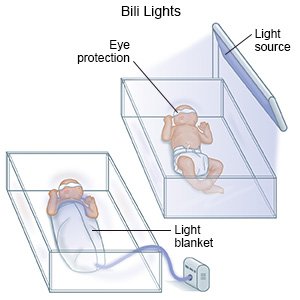Erythroblastosis Fetalis
Medically reviewed by Drugs.com. Last updated on Jul 7, 2024.
Erythroblastosis fetalis is a condition that causes your unborn baby's red blood cells (RBCs) to break down. This may cause severe anemia (low RBC count). Anemia makes it difficult for the RBCs in your baby's blood to carry enough oxygen to his or her body. Your baby may need more tests or treatment after he or she is born. Go to all follow-up appointments so healthcare providers can help your baby grow and develop well.
WHILE YOU ARE HERE:
Informed consent
is a legal document that explains the tests, treatments, or procedures that your child may need. Informed consent means you understand what will be done and can make decisions about what you want. You give your permission when you sign the consent form. You can have someone sign this form for you if you are not able to sign it. You have the right to understand your child's medical care in words you know. Before you sign the consent form, understand the risks and benefits of what will be done to your child. Make sure all of your questions are answered.
An IV
is a small tube placed in your child's vein that is used to give medicine or liquids.
Medicines:
- Immune globulin helps keep your baby's RBCs from being damaged by your antibodies. This treatment may help prevent the need for an exchange transfusion.
- Medicine for increased bile flow helps your baby's body remove bilirubin in bile. Bile is fluid made by his or her liver. The bile carries the bilirubin into the intestines. Your baby gets rid of it in bowel movements. This medicine increases the flow of bile into his or her intestines.
Blood tests
may be taken from the umbilical cord when your baby is born. Your baby may have a catheter (small tube) placed in his or her umbilical cord stump. It may be used to draw blood and give him or her fluids. Your baby's blood may be checked for blood type, antibodies, RBC count, and bilirubin level. Your baby may need to have blood drawn more than 1 time.
Treatment:
- Phototherapy uses light to turn bilirubin into a form that your newborn's body can remove. One or more lights will be placed above your baby. He or she will be placed on his or her back to absorb the most light. Your baby may also lie on a flexible light pad, or his or her healthcare provider may wrap him or her in the light pad. Eye covers are used to protect his or her eyes from the light.

- An exchange transfusion is a procedure that removes the antibodies that are attacking RBCs and some of the bilirubin. Small portions of your baby's blood will be removed and replaced with donor blood. This procedure may need to be done more than 1 time.
Treatment options
The following list of medications are related to or used in the treatment of this condition.
RISKS:
Your baby may have breathing or other problems if he or she was born earlier than expected. Without treatment, your baby may have anemia that can lead to decreased oxygen to his or her brain, heart, and other organs. Your unborn baby may get hydrops fetalis, a condition that causes his or her body to swell with fluid. This may cause bleeding or heart failure. Bilirubin levels that get too high can cause hearing loss or brain damage, and may be life-threatening.
CARE AGREEMENT:
You have the right to help plan your baby's care. Learn about your baby's health condition and how it may be treated. Discuss treatment options with your baby's healthcare providers to decide what care you want for your baby.© Copyright Merative 2024 Information is for End User's use only and may not be sold, redistributed or otherwise used for commercial purposes.
The above information is an educational aid only. It is not intended as medical advice for individual conditions or treatments. Talk to your doctor, nurse or pharmacist before following any medical regimen to see if it is safe and effective for you.
Learn more about Erythroblastosis Fetalis
Treatment options
Care guides
Further information
Always consult your healthcare provider to ensure the information displayed on this page applies to your personal circumstances.
